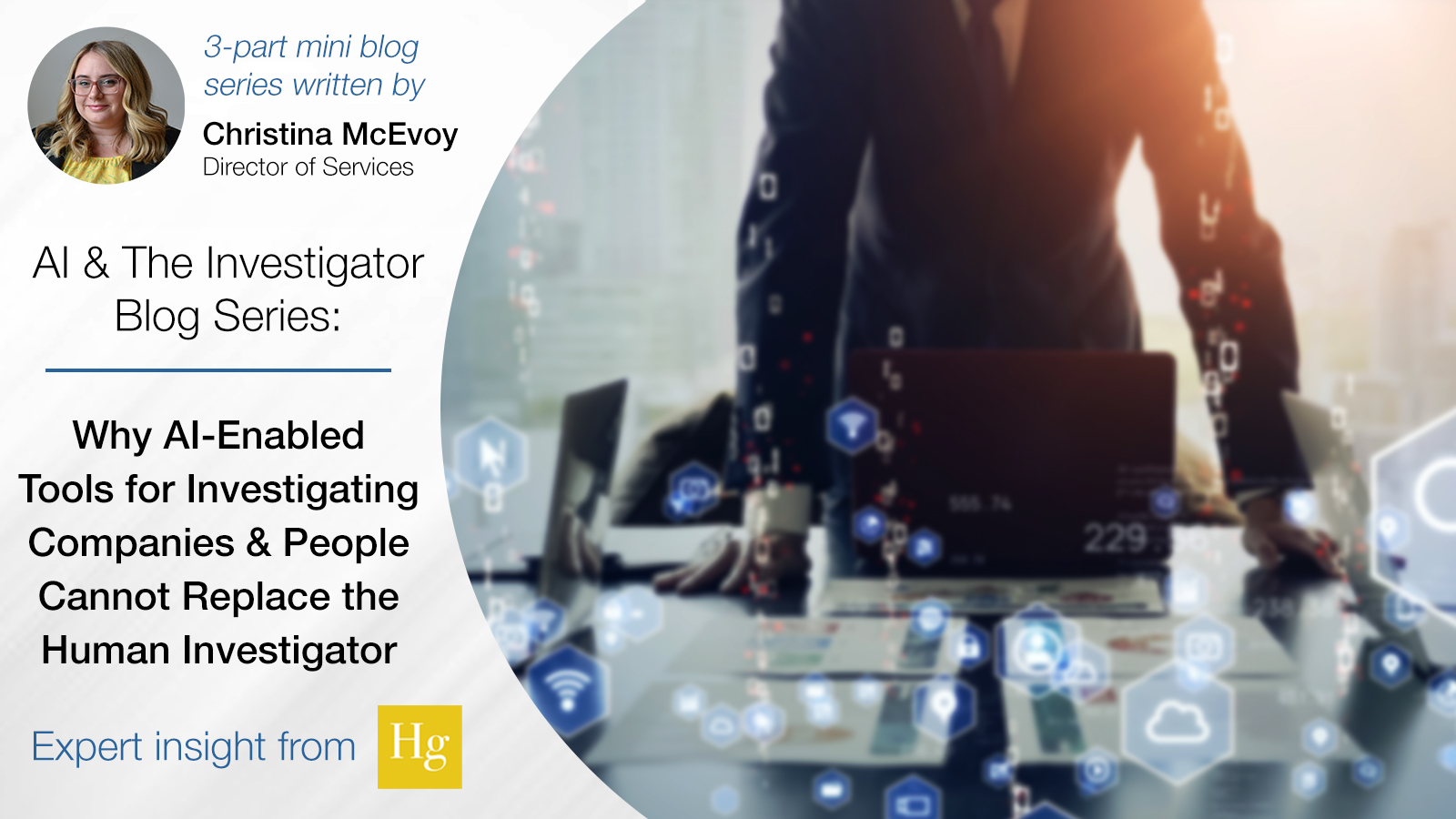Why AI-Enabled Tools for Investigating Companies & People Cannot Replace the Human Investigator
January 23, 2024 | by Christina McEvoy
This is part 3 our 3-part mini-blog series.
 It may be tempting to think that a corporate research and due diligence department could simply invest in AI technologies and eliminate the need for contracts with external private investigations firms. While AI tools play a crucial role in enhancing the effectiveness of open source due diligence investigations, the tools alone can never replace human investigators for the following reasons:
It may be tempting to think that a corporate research and due diligence department could simply invest in AI technologies and eliminate the need for contracts with external private investigations firms. While AI tools play a crucial role in enhancing the effectiveness of open source due diligence investigations, the tools alone can never replace human investigators for the following reasons:
- Contextual Understanding – Only humans possess the ability to interpret data for context, which is something that AI lacks. Cultural nuance, wit, sarcasm and the broader interpretation of language and visual information cannot be machine-replicated.
- Critical Thinking – Human investigators innately excel in critical thinking and reasoning, core competencies that are essential for assessing the accuracy and reliability of information. AI operates from following data patterns but lacks ability to evaluate the data itself.
- Adaptability – To be an investigator, one must be highly adaptive, adroitly navigating changing situations and unexpected discoveries. Humans can naturally pivot and adjust their investigative approach, while AI systems frequently struggle in novel scenarios because they glean data best from patterns and repetition.
- Ethical and Legal Considerations – AI has no facility for ethical reasoning and may not comprehend legal boundaries in the investigative process. Human investigators are equipped to navigate the complexities of privacy, consent and ethical considerations when engaged in OSINT gathering activities.
- Creativity and Intuition – The art and science of investigation involves creative problem solving and following intuition, which are innately human traits. Humans can connect seemingly unrelated pieces of information to arrive at conclusions AI may likely miss.
- Communication and Interview Skills – Interpersonal skills are at the heart of effective investigations. The ability to establish rapport to glean data, conduct interviews, interpret body language, and extract information from the context of conversations are all human traits that are impossible to replicate artificially.
- Ability to Navigate Unstructured Environments – AI is programmed to identify patterns; humans excel at following patterns but also adapting to dynamic, unpredictable, and unstructured environments. Humans can adapt to the unpredictability of open source data and capably pursue new strategies while AI systems are frequently challenged by unexpected data formats or sources.
- Bias and Fairness – AI models are unable to identify bias and address it while humans can discern bias and mitigate its impact on the investigatory process.
- Emotional Intelligence – Understanding human emotions and motivations plays a critical role in the investigatory process. AI tools lack an understanding of emotion and cannot assess data within the context of emotional intelligence.
- Excessive Reliance on Technology – Relying solely on technology for conducting due diligence investigations is extremely risky as vital details will most assuredly be overlooked. At all stages of an investigation, human oversight is crucial for interpreting data, validating findings and drawing conclusions that lead to actionable insights. Relying too heavily on automated tools to gather data can often be insufficient for genuine due diligence without also including the analytical capabilities of a human investigator.
AI-enabled tools offer the opportunity to automate much of the OSINT gathering process, but none of these tools can replace the critical thinking of human investigators. From understanding which AI tool to utilize, to knowing the proper keywords to use when conducting an AI-enabled search, to assessing all data gathered to devise an action plan, at every turn, human cognition is essential to drive a productive investigation. Recognizing relationships within a vast amount of data and formulating a strategy based on that data are inherently and solely human capabilities. Further, investigators often have years of experience in law enforcement, military, security, or corporate settings that enable them offer informed counsel to their clients in the realm of due diligence and risk mitigation.
While the sophistication of AI-enabled tools continues to evolve, investigators need not fear that their roles at the fore of due diligence investigations will be supplanted by machine-driven intelligence. AI accelerates the gathering of data, but the interpretation of data will always depend on the critical thinking skills of credentialed investigators.



